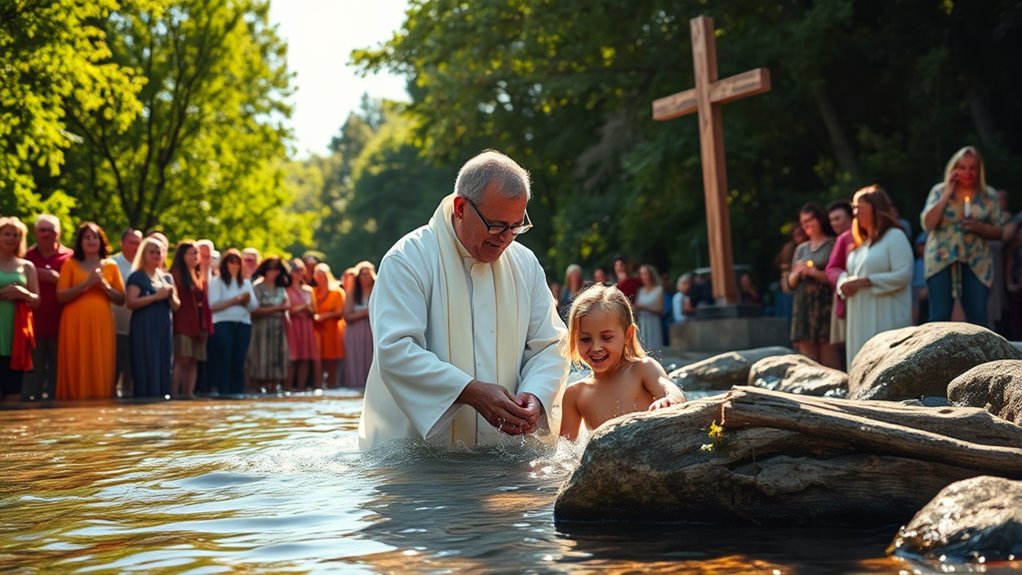Baptism is a key step in your faith journey, symbolizing your commitment to Christ, spiritual cleansing, and rebirth. It reflects your decision to follow Jesus and signifies your entrance into God’s community. Through water, it represents inner renewal and the start of a new life filled with hope and spiritual growth. If you want to understand its deeper meaning and significance, continuing will give you a clearer picture of why Christians find baptism so important.
Key Takeaways
- Christians get baptized as a command from Jesus to symbolize purification, rebirth, and commitment to Christ.
- Baptism signifies spiritual cleansing from sin and entry into God’s covenant community.
- It publicly demonstrates faith and dedication to following Jesus Christ.
- Baptism acts as a spiritual reset, marking personal growth and renewal in the believer’s faith journey.
- The practice reflects biblical teachings and various traditions that emphasize its importance in Christian life.
The Biblical Foundations of Baptism

Understanding the biblical foundations of baptism helps clarify its significance in the Christian faith. Throughout early church practices, baptism was consistently seen as an essential step in becoming part of the Christian community. Scriptures like Matthew 28:19 emphasize Jesus’ command to baptize believers, highlighting its importance. However, baptismal controversies arose over issues like the method and timing of baptism, sparking debates that influenced church traditions. These debates reflect differing interpretations of biblical teachings, yet all agree that baptism signifies a believer’s commitment to Christ. By examining these biblical foundations, you see that baptism isn’t just a ritual but a profound act rooted in scripture, symbolizing purification, rebirth, and entrance into God’s covenant with His people. Additionally, understanding the relevance of modern technology in religious practices can help contextualize how contemporary tools influence traditional ceremonies. Recognizing the role of church history in shaping baptismal rites further illustrates the depth of its biblical and cultural significance. Moreover, appreciating the security concerns related to new religious tokens can deepen understanding of how faith and technology intersect today.
Furthermore, recent studies on historical baptismal methods reveal how practices have evolved over centuries, enriching the understanding of their biblical roots.
Different Types of Baptism in Christianity

Within the diverse practices of Christianity, various forms of baptism reflect different theological beliefs and traditions. You might encounter infant baptism, where babies are baptized to include them in the faith community early on. This practice emphasizes God’s grace and the child’s inclusion in the covenant. Another common form is baptismal immersion, where you are fully submerged in water, symbolizing death to sin and rebirth. Some denominations prefer sprinkling or pouring water over the head, which also signifies cleansing and renewal. While the methods differ, each type aims to mark a spiritual passage and commitment. Understanding these variations helps you appreciate how different Christian communities express their faith through baptism, aligning with their unique interpretations of Scripture and tradition. Additionally, sound design plays a role in enhancing the worship experience during baptisms, creating a more immersive and meaningful ceremony. Recognizing the different baptismal methods highlights how tradition and symbolism shape each community’s approach to this sacred rite. This diversity also reflects the broader theological beliefs about salvation and spiritual renewal held by different denominations.
The Symbolic Meaning Behind Water Baptism

Water baptism symbolizes both spiritual cleansing and your commitment to faith. It’s a public way to show others that you’ve chosen to follow Christ. Through this act, you express your renewed life and dedication to God’s path. Additionally, understanding the support hours for your church or community center can enhance your preparation for baptism.
Cleansing Spiritual Significance
Baptism serves as a powerful symbol of spiritual cleansing, representing the removal of sin and the beginning of a new life in Christ. When you are immersed in water, it reflects water purity, symbolizing the washing away of impurities and spiritual burdens. This act signifies that your sins are forgiven, and you are starting fresh, renewed in faith. The water’s cleansing power illustrates how spiritual cleansing restores your relationship with God, removing guilt and shame. It’s not just a physical act but a profound expression of inner transformation. Through baptism, you acknowledge that Christ’s sacrifice has purified you, making your soul clean and prepared for the journey of faith ahead. This ritual embodies hope, renewal, and the promise of spiritual renewal. Additionally, understanding the significance of spiritual energy can deepen your appreciation of this sacred act as a moment of aligning oneself with divine vitality and purpose. Recognizing that water can symbolize emotional renewal emphasizes the emotional and psychological aspects of spiritual rebirth during baptism. Engaging in the personal growth techniques associated with spiritual practices can enhance your experience of renewal and commitment. Embracing this holistic approach can help believers see baptism as an integral part of their overall spiritual well-being and growth.
Public Declaration of Faith
Because it is a public act, baptism serves as a clear declaration of your faith to others. When you participate in a baptism service, you’re showing your commitment to Christ and joining your church community. Your church attendance often increases around this time, emphasizing your desire to grow spiritually and connect with fellow believers. The baptism attire you choose, typically simple and modest, symbolizes purity and your new life in Christ. By publicly sharing your faith, you encourage others to contemplate their own spiritual journey. This act isn’t just about personal belief; it’s a visible testament to your decision to follow Jesus, inspiring those around you and reinforcing your dedication to living out your faith openly. Additionally, understanding the significance of water baptism helps believers grasp its role in their spiritual growth and community witness. Recognizing the symbolic meaning behind water baptism can deepen your appreciation for this meaningful rite and its impact on your faith journey, especially as it reflects themes of uncertainty and longing in love that resonate in spiritual renewal. The efficacy of mammography in early detection underscores the importance of timely and appropriate spiritual practices in nurturing faith. Embracing this spiritual symbolism can foster a greater sense of purpose and connection within your faith community.
The Significance of Baptism in Christian Faith

Understanding the significance of baptism in the Christian faith reveals its essential role in symbolizing a believer’s new life in Christ. Historically, baptism has roots in early Christian communities, representing purification and commitment. Over time, different cultural influences shaped how baptism is performed and understood, reflecting local traditions and beliefs. For example, some cultures emphasize immersion, while others incorporate specific rituals or symbols. Cost-effective production techniques have allowed churches and communities to perform baptisms more widely and accessibly, emphasizing the practice’s importance. This diversity highlights that, despite variations, baptism consistently signifies your passage from old to new life, affirming your faith and acceptance of Christ’s teachings. Recognizing these historical perspectives and cultural influences helps you appreciate baptism’s deep spiritual meaning and its unifying role across different Christian communities worldwide. Cultural influences also show how local customs have enriched the practice, making it a uniquely meaningful experience for believers everywhere.
The Role of Baptism in Spiritual Renewal

When you undergo baptism, it serves as a powerful step toward spiritual renewal, offering a fresh start in your faith journey. Baptism symbolizes inner transformation, signaling a release from past struggles and a commitment to growth. It acts as a spiritual reset, allowing you to reconnect with God and deepen your relationship with Him. Through this act, you invite the Holy Spirit to work within you, fostering inner renewal that impacts your thoughts, actions, and attitudes. Baptism isn’t just a ritual; it’s a catalyst for ongoing change, encouraging you to pursue holiness and align your life with Christ’s teachings. By embracing baptism, you open yourself to continuous spiritual renewal, strengthening your faith and renewing your sense of purpose in God’s plan. Recognizing that prophetic dreams have historically been viewed as divine messages can inspire a deeper understanding of spiritual symbols and signs during your faith journey.
How Baptism Reflects Commitment and Acceptance

When you choose to be baptized, you publicly declare your faith and commitment to Christ. It’s a powerful symbol of starting fresh and embracing a new life in Him. Through this act, you accept His love and show others your dedication to following His path.
Public Declaration of Faith
Have you ever wondered what it truly means to publicly declare your faith? Baptism is more than a personal choice—it’s a powerful statement to your community. Through water symbolism, baptism represents cleansing and new beginnings, showing your commitment to Christ. When you get baptized, you’re also involving your community, openly accepting their support and accountability. This act signifies your acceptance of God’s grace and your desire to live according to His teachings. It’s a visible sign that you’re part of a larger faith family. Your public declaration encourages others to contemplate their own faith journey. By choosing baptism, you’re not only affirming your beliefs but also inspiring others to take similar steps of faith and community involvement. Additionally, the act of baptism can foster emotional resilience, helping believers navigate life’s challenges with renewed strength and hope. Engaging in this sacrament can also deepen your understanding of spiritual renewal, reinforcing your commitment to spiritual growth and transformation. Recognizing the history of baptism can provide a deeper appreciation of its significance across different cultures and eras.
Symbol of New Life
Baptism serves as a powerful symbol of new life, reflecting your commitment to spiritual renewal and acceptance of God’s grace. The water symbolism in baptism signifies cleansing and purification, washing away past mistakes and doubts. When you are immersed in water or have water poured over you, it represents a fresh start—your spiritual rebirth. This act publicly acknowledges your decision to follow Christ and embrace a transformed life. Water, as a symbol of renewal, reminds you that through baptism, you leave behind old ways and step into a new existence rooted in faith. It’s a meaningful gesture that visually embodies your journey toward spiritual growth, hope, and a renewed connection with God. Additionally, understanding the performance and efficiency of water-based rituals helps deepen your appreciation of its significance, as these rituals are often designed to maximize their symbolic impact and spiritual efficacy.
The Journey of Baptism: From Ritual to Personal Faith

The journey of baptism often begins as a meaningful ritual, but for many believers, it evolves into a deeply personal expression of faith. As you grow in your spiritual walk, baptism can symbolize more than tradition; it becomes a milestone of personal growth and commitment. You might start by following cultural traditions, but over time, your understanding deepens. This process allows you to connect with your faith on a more intimate level, making baptism a reflection of your journey.
Consider these aspects:
Reflect on personal faith, commitment, and growth through your baptism journey.
- Embracing your faith personally
- Moving beyond cultural expectations
- Recognizing baptism as a step of commitment
- Reflecting on your spiritual growth
- Connecting with a community of believers
Frequently Asked Questions
Can Infants Truly Understand the Significance of Baptism?
You wonder if infants truly grasp the significance of baptism, given their limited infant comprehension and spiritual awareness. Since babies can’t understand the meaning fully, many Christian traditions practice infant baptism as a way to entrust their spiritual future to God’s grace. By doing so, you’re acknowledging that faith isn’t solely about understanding but also about God’s promise and your commitment to nurture their spiritual growth from the start.
Is Baptism Necessary for Salvation in All Christian Denominations?
Did you know that about 31% of Christians believe baptism is necessary for salvation? In many denominations, it’s seen as a crucial step in making a faith commitment and symbolizes cleansing and rebirth. However, some groups emphasize faith alone for salvation, viewing baptism as optional or symbolic. So, whether it’s necessary depends on your denomination’s beliefs, but it often holds deep spiritual significance regardless.
How Does Baptism Differ Between Catholic, Protestant, and Orthodox Churches?
You’ll notice that the Sacramental differences and Ritual variations in baptism vary among Catholic, Protestant, and Orthodox churches. Catholics and Orthodox often practice infant baptism, emphasizing its sacramental importance for salvation. Protestants usually prefer believer’s baptism, focusing on personal faith. In Catholic and Orthodox traditions, baptism involves anointing and immersion or pouring, while many Protestants opt for simple immersion or sprinkling. These variations reflect differing theological views and church traditions.
What Are the Long-Term Spiritual Benefits of Being Baptized?
You wonder about the long-term spiritual benefits of baptism, and it’s more profound than you think. As you walk this faith journey, baptism ignites spiritual growth and renews your commitment. It’s a symbol of new beginnings, helping you stay connected to your faith during challenges. Over time, it deepens your sense of purpose, strengthens your relationship with God, and fuels ongoing renewal, shaping your spiritual life in ways you might not yet fully realize.
Can Someone Be Re-Baptized if They Previously Declined Faith?
If you’re considering re-baptism after declining faith, it’s important to think about re-baptism considerations and faith reaffirmation. You might feel the need to reaffirm your commitment or start fresh spiritually. Many churches welcome re-baptism if it helps you reconnect with your faith. Talk with your spiritual leader to understand the specific requirements and whether re-baptism aligns with your spiritual journey and personal convictions.
Conclusion
Baptism is more than a ritual; it’s a powerful symbol of your faith and commitment. It signifies your spiritual renewal and acceptance into the Christian community. Remarkably, studies show that nearly 70% of Christians view baptism as a crucial step in their faith journey. Embracing this tradition can deepen your relationship with God and mark a meaningful milestone in your spiritual life. Ultimately, baptism invites you into a lifelong journey of faith and renewal.










